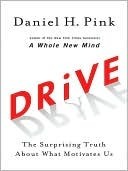More on this book
Community
Kindle Notes & Highlights
PETER F. DRUCKER
W. EDWARDS DEMING
FREDERICK HERZBERG
JIM COLLINS
Collins suggests four basic practices for creating a culture where self-motivation can flourish: 1. “Lead with questions, not answers.” 2. “Engage in dialogue and debate, not coercion.” 3. “Conduct autopsies, without blame.” 4. “Build ‘red flag’ mechanisms.” In other words, make it easy for employees and customers to speak up when they identify a problem.
CALI RESSLER AND JODY THOMPSON
GARY HAMEL
The Type I Fitness Plan: Four Tips for Getting (and Staying) Motivated to Exercise
Set your own goals.
Ditch the treadmill. Unless you really like treadmills, that is. If trudging to the gym feels like a dreary obligation, find a form of fitness you enjoy—that produces those intoxicating moments of flow.
Keep mastery in mind. Getting better at something provides a great source of renewable energy. So pick an activity in which you can improve over time.
Drive: The Recap
TWITTER SUMMARY
Carrots & sticks are so last century. Drive says for 21st century work, we need to upgrade to autonomy, mastery & purpose.
COCKTAIL PARTY SUMMARY
When it comes to motivation, there’s a gap between what science knows and what business does. Our current business operating system— which is built around external, carrot-and-stick motivators—doesn’t work and often does harm. We need an upgrade. And the science shows the way. This new approach has three essential elements: (1) Autonomy—the desire to direct our own lives; (2) Mastery—the urge to make progress and get better at something that matters; and (3) Purpose—the yearning to do what we do in the service of something larger than ourselves.
The Drive Discussion Guide: Twenty Conversation Starters to Keep You Thinking and Talking
Has Pink persuaded you about the gap between what science knows and what organizations do?
How well is your current job meeting your need for “baseline rewards”—salary, benefits, a few perks? If it’s falling short, what changes can you or your organization make?
If you’re a boss, how might you replace “if-then” rewards with a more autonomous environment and the occasional “now that” reward?
Describe a time recently when you’ve experienced “flow.” What were you doing? Where were you? How might you tweak your current role to bring on more of these optimal experiences?
Is education today too Type X—that is, does it put too great an emphasis on extrinsic rewards? If so, how should we reconfigure schools and classrooms? Is there an elegant way to reconcile intrinsic motivation and accountability?
FIND OUT MORE—ABOUT YOURSELF AND THIS TOPIC Are you Type I or Type X? Take the comprehensive, free online assessment at www.danpink.com/drivesurvey
ALSO BY DANIEL H. PINK Free Agent Nation A Whole New Mind The Adventures of Johnny Bunko


